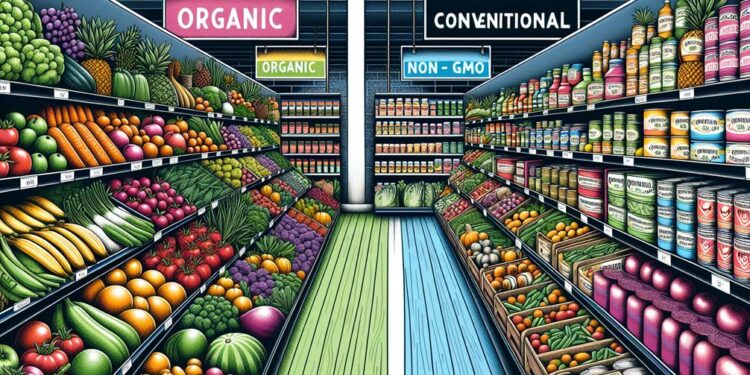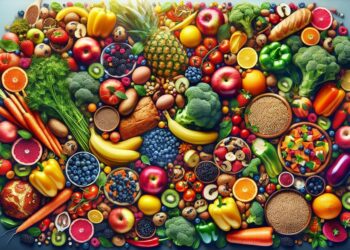Did you know that organic food sales in the United States have more than doubled in the past decade, reaching over $55 billion in 2019? With the increasing interest in healthier eating, it's no wonder that the organic vs. conventional debate has become a hot topic. But how do you navigate through the sea of information to make the best choice for your health? In this discussion, we'll explore the facts surrounding organic and conventional food, from pesticide residue levels to nutritional differences, environmental impact, and cost. By the end, you'll have a clearer understanding of the factors to consider when making a healthier choice for you and your family.
Key Takeaways
- Organic certification ensures environmentally sustainable and animal-friendly practices, providing consumer confidence.
- Choosing organic reduces exposure to pesticide residues found in conventional foods, which are linked to health effects.
- Organic foods may contain slightly higher levels of certain nutrients, such as vitamin C, iron, magnesium, and antioxidants.
- Organic farming practices prioritize natural pest control methods, improve soil health, water retention, and have a lower carbon footprint compared to conventional methods.
Understanding Organic Certification
Do you know what it means for a food to be certified organic? When you see the organic label on a food product, it signifies that it has been produced using practices that promote environmental sustainability and the well-being of animals. To ensure that these organic standards are being met, third party certification is required. This means that an independent organization, separate from the producer and the government, has evaluated and verified that the food meets the necessary requirements to be labeled as organic.
The organic label is not just a marketing ploy; it carries real significance. In order for a product to be certified organic, it must adhere to rigorous guidelines established by the United States Department of Agriculture (USDA). These guidelines cover various aspects of production, including soil management, pest control, and the use of additives and antibiotics. Organic farmers must use natural and sustainable methods to maintain soil fertility, control pests, and promote crop diversity.
Third party certification is crucial to ensure the integrity of the organic label. These certifying organizations assess farms and food processors to ensure they are following the organic standards. They conduct regular inspections, review records, and test samples to verify compliance. By providing an unbiased evaluation, third party certification instills confidence in consumers that the organic products they purchase are indeed produced according to strict organic standards.
Examining Pesticide Residue Levels
Pesticide residue levels in organic and conventional foods are a critical aspect to consider when comparing their safety and potential health effects. Understanding the regulations surrounding pesticide use and residue levels can help you make an informed choice about the food you consume. Here are four important points to consider:
- Pesticide regulations: Organic foods are produced without the use of synthetic pesticides, while conventional foods may contain residues from approved pesticides. Regulatory agencies set maximum residue limits (MRLs) to ensure that pesticide levels are within safe ranges. However, it is worth noting that MRLs are established for individual pesticides and not for combinations of multiple pesticides.
- Health effects: Pesticide residues in conventional foods have been linked to various health effects, including an increased risk of certain cancers, neurodevelopmental disorders in children, and hormonal disruptions. The long-term consequences of chronic exposure to low levels of multiple pesticides are still under investigation.
- Organic advantage: Choosing organic foods can reduce your exposure to pesticide residues. Studies have shown that consuming an organic diet can significantly lower the levels of pesticide metabolites in urine samples.
- Risk-benefit analysis: When comparing organic and conventional foods, it is essential to consider the potential health risks associated with pesticide residues in conventional foods and the potential benefits of choosing organic foods.
Assessing Nutritional Differences

Assessing the nutritional differences between organic and conventional foods provides valuable insights into their potential impact on overall dietary quality. One key aspect to consider is nutrient absorption. Research suggests that organic foods may have slightly higher levels of certain nutrients compared to their conventionally grown counterparts. For example, studies have found that organic fruits and vegetables may contain higher levels of vitamin C, iron, magnesium, and antioxidants. These nutrients play crucial roles in maintaining good health and supporting the body's functions.
Another important factor to consider is the potential long-term health effects of consuming organic versus conventional foods. While some studies have shown that organic foods may have lower levels of pesticide residues, it is unclear how these differences may translate into long-term health outcomes. More research is needed to fully understand the potential benefits or risks associated with consuming organic versus conventional foods.
Weighing Environmental Impact
Evaluating the environmental impact is crucial when comparing organic and conventional food choices. By considering sustainable farming practices and carbon footprint reduction, you can make a more informed decision about the food you consume. Here are four key factors to consider:
- Pesticide Use: Organic farming practices prioritize the use of natural pest control methods, such as crop rotation and the use of beneficial insects. This reduces the need for chemical pesticides, which can have detrimental effects on soil health, water quality, and biodiversity.
- Soil Health: Organic farming practices focus on building and maintaining healthy soil through practices like composting and cover cropping. This improves soil fertility, water retention, and reduces erosion. Conventional farming, on the other hand, often relies on synthetic fertilizers and pesticides, which can degrade soil quality over time.
- Water Conservation: Organic farming generally uses less water compared to conventional methods. This is because organic farmers prioritize soil health, which improves water retention. Additionally, organic farmers often use efficient irrigation techniques and avoid the use of synthetic chemicals that can contaminate water sources.
- Carbon Footprint: Organic farming practices tend to have a lower carbon footprint compared to conventional farming. This is because organic farming relies less on fossil fuel-intensive practices like synthetic fertilizer production and pesticide application. Additionally, organic farms often prioritize carbon sequestration through practices like cover cropping and agroforestry.
Considering Cost and Accessibility

Considering the cost and accessibility of organic and conventional food options is essential when making informed decisions about your dietary choices. Conducting a cost comparison and availability analysis can help you determine which option is more suitable for your needs.
When it comes to cost, conventional foods are generally cheaper than organic foods. The higher prices of organic foods can be attributed to the additional costs involved in organic farming practices, such as avoiding synthetic pesticides and fertilizers. However, it is important to note that the cost difference can vary depending on the specific products and brands.
Accessibility is another important factor to consider. Conventional foods are widely available in most grocery stores, making them easily accessible to consumers. On the other hand, organic foods may be less readily available, especially in smaller towns or rural areas. However, the availability of organic foods has been increasing over the years as demand grows.
To make an informed decision, it is crucial to weigh the cost and accessibility factors based on your personal circumstances. If budget is a major concern, conventional foods may be a more practical choice. However, if you prioritize health benefits and are willing to spend a bit more, organic foods can offer a safer and more environmentally friendly option. Ultimately, the choice between organic and conventional foods should align with your personal preferences, budget, and accessibility.
Frequently Asked Questions
How Does Organic Farming Affect Soil Health and Biodiversity?
Organic farming positively impacts soil health and biodiversity. It promotes nutrient cycling and maintains ecosystem balance by avoiding synthetic pesticides and fertilizers. This approach supports the growth of beneficial microbes and organisms, contributing to a healthier and more sustainable agricultural system.
Are There Any Specific Regulations Regarding the Use of Genetically Modified Organisms (Gmos) in Organic Farming?
There are regulations in place regarding the use of genetically modified organisms (GMOs) in organic farming. These include GMO labeling regulations and GMO free certification to ensure transparency and consumer choice.
What Are the Potential Risks and Benefits Associated With Consuming Pesticide Residues in Conventional Produce?
You may be wondering about the potential health risks and benefits of consuming pesticide residues in conventional produce. Research suggests that while there are risks associated with pesticide exposure, consuming fruits and vegetables, regardless of pesticide residues, provides numerous health benefits.
How Does the Use of Antibiotics in Conventional Animal Farming Impact Human Health?
The use of antibiotics in conventional animal farming can have a significant impact on human health. It contributes to the development of antibiotic resistance, making it harder to treat bacterial infections effectively.
Are There Any Long-Term Studies Comparing the Health Outcomes of Individuals Consuming Organic Versus Conventional Diets?
Have you ever wondered about the health differences between organic and conventional diets? Research comparing health outcomes suggests that organic diets may have a positive impact on nutrition and overall well-being.
Conclusion
After examining the differences between organic and conventional foods, it is clear that making healthier choices goes beyond just the label. While organic certification ensures certain standards are met, it doesn't guarantee superior nutrition. Pesticide residue levels may be lower in organic produce, but the overall impact on health remains uncertain. The environmental benefits of organic farming are evident, but accessibility and cost may limit its reach. Therefore, when navigating the food facts, it is essential to consider a variety of factors for a well-rounded and informed decision.













